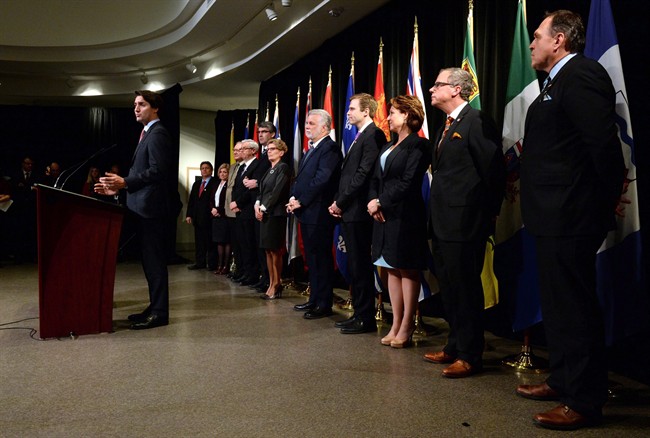For the second time since taking office last fall, Prime Minister Justin Trudeau will sit down this week with provincial and territorial leaders from across Canada.

The meeting, set for Thursday in Vancouver, will have climate change policy as its central theme, and may not be as cordial (at least behind the scenes) as the gathering held last November. Here’s what Canadians can expect:
Carbon pricing
Ottawa has made no secret of the fact that it wants to set a national price on carbon emissions, and that the groundwork should be laid at this meeting.
Sources who spoke to the Canadian Press recently said that a widely cited starting price of $15 per tonne is far from a certainty at this stage. Coming up with a number won’t be easy, and it’s unlikely to happen this week.
In addition to the ongoing and vocal opposition from Saskatchewan Premier Brad Wall, Trudeau and the premiers will need to contend with the fact that several provinces already have pricing schemes in place. Quebec’s cap-and-trade market with California, which Ontario will join in 2017, has a current carbon price of about $17 a tonne. British Columbia’s carbon tax, meanwhile, is $30 per tonne.

Get daily National news
READ MORE: Canada’s first ministers hope to find common ground at environment meetings
The major move forward, expected to be announced after the meeting on Thursday, is the creation of four working groups to consult and study clean technology and innovation, reducing carbon emissions, adaptation, and establishing a pan-Canadian price on carbon. The groups will be given six months to study these issues before reporting back to the first ministers with concrete recommendations.
Pipeline issues
The Energy East pipeline proposal has become even more contentious in the days leading up to the meeting in Vancouver, with Quebec’s provincial government announcing on Tuesday that it will file an injunction that could temporarily halt the project.

In Saskatchewan, Wall said the move is likely to be “divisive,” while Alberta Premier Rachel Notley said if Quebec wants the power to veto the pipeline, the province will fight back vigorously.
“I am going to leave the gun in the holster until we are actually at the gunfight,” she added.
The premiers are unlikely to attack each other publicly over the project while in Vancouver, but there may be conflicting messages coming out of their camps, and Energy East could represent a sore point around the table.
Focus on First Nations
Trudeau and the premiers are meeting with First Nations leaders on Wednesday before their own meeting the following day. The Prime Minister’s Office said Trudeau would meet with representatives from the Assembly of First Nations, the Inuit Tapiriit Kanatami and the Métis National Council. The focus will be on a “pan-Canadian framework” for tackling climate change.
There has been controversy in the lead-up to these meetings, however, as both the Congress of Aboriginal Peoples and the Native Women’s Association of Canada did not receive invitations and wrote to the prime minister and premiers to complain.
With files from The Canadian Press.
- Trump threatens Canada with 50% tariff on aircraft sold to U.S.
- B.C. premier calls meeting between Alberta separatists, Trump officials ‘treason’
- Pierre Poilievre prepares for leadership review as Conservatives gather in Calgary
- Gun buyback not hurt by some provinces, police refusal to help: minister








Comments